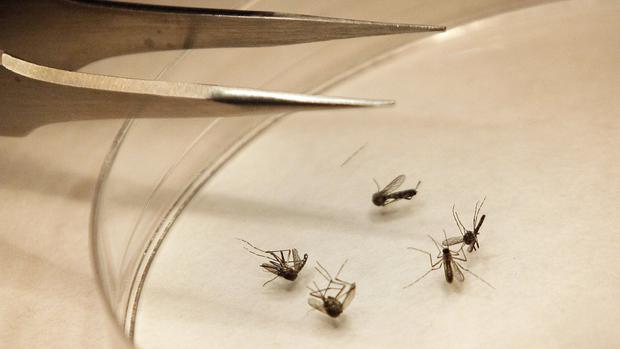West Nile virus cases continue to climb, CDC says
(CBS News) The Centers for Disease Control and Prevention (CDC) today announced there have been a total of 3,142 cases of the virus reported with 134 deaths as of Sept. 18. Of those, 1,630 were classified as neuroinvasive disease, with neurologic or brain-related complications such as meningitis or encephalitis, and 1,512 were classified as non-neuroinvasive.
Pictures: West Nile Virus outbreak 2012
Watch: Living with the effects of West Nile Virus
West Nile virus outbreak: How to protect yourself
Last week, the CDC announced 2,636 cases of the virus with 118 deaths - representing a 19 percent rise in reported cases over the week.
The newly released numbers are the highest reported to CDC through the third week in September since 2003. The worst year for disease saw nearly 3,000 severe cases and 284 deaths, the Associated Press previously reported. Previous week-to-week statistics announced by the CDC were as high as 30 percent increases in cases.
Two thirds of all West Nile virus cases have been come from seven states - Texas, Mississippi, Michigan, South Dakota, Louisiana, Oklahoma, and California - and almost 40 percent of all cases have been reported from Texas.
West Nile virus usually occurs in North America from the summer through the fall, according to the CDC. It spreads mostly through infected mosquitoes (which become infected from feeding off birds) but in rare cases can spread through transfusions, transplants, breastfeeding and during pregnancy from mother through baby.
About 80 percent of people won't feel symptoms if they are infected, and 20 percent may develop "West Nile fever" or non-neuroinvasive disease, with symptoms like fever, headache, body aches, nausea, vomiting and sometimes a skin rash on the chest, stomach and back. Those symptoms typically develop between 3 and 14 days after infection, and may last for several weeks with resulting fatigue lasting even longer.
But, CDC estimates suggest approximately one out of 150 people infected will develop severe neuroinvasive illness, characterized by high fever, headache, neck stiffness, stupor, disorientation, coma, tremors, convulsions, muscle weakness, vision loss, numbness and paralysis. These symptoms can last for weeks and the neurological damage may be permanent. People over 50 are at the highest risk for developing a severe illness.
The best way to reduce risk for West Nile is to reduce risk of mosquito bites, the CDC said. The agency recommends using an using insect repellent containing an EPA-registered active ingredient, wearing long sleeves and pants during dusk and dawn, making sure windows have screens and emptying puddles of stagnant water where mosquitoes may breed.
The CDC has more on West Nile virus.

